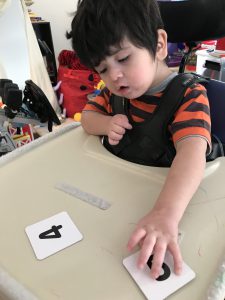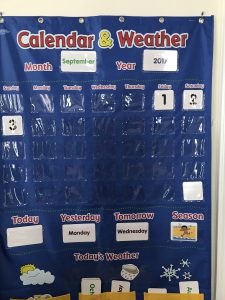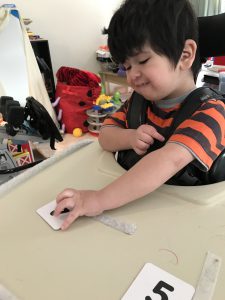
Joey giggled as he selected the number 14 from the two cards I’d placed in front of him, and then giggled further as I slid the 14 into the correct spot on the calendar. Apparently, something about the 14 was very, very funny. We had just begun using a preschool wall calendar with Joey, and we were all a bit surprised at just how much Joey enjoyed the calendar work. After his giggling over the number 14, I took two other numbers out of the pocket calendar – the 3 and the 5 – and asked Joey to give me the number 3. He giggled again, giving his biggest smile, as though to say “I love these numbers. Give me some more.”
This summer we began to work with Joey on understanding the days of the week. This is a common beginning of the day routine in most preschool classes, and we want Joey to be learning the same preschool skills as typically developing children. Yet understanding the days of the week and the concept of the passage of time seems even more important for a child like Joey, who cannot wake up in the morning and ask, “Who is coming to work with me today?”
Any of you who live with a three-year-old are probably familiar with their love of structure and control. They seem to be looking for ways to categorize their environments, and understand the world. My own three-year-old makes random comments from her observations like “Birds like trees” and “On Mondays it rains” as she tries to look for order and patterns in the world. She is obviously not always correct, but searching for these patterns is helping her learn about her world.
As children seek to understand their world, they begin to identify patterns within the passage of time. Knowing that the days of the week are a pattern, and that certain events happen at certain times, can give children a sense of control over their world. This lets them feel that they are not at the whims of the adults in their world. Although children may not be able to change the course of these events (going to the doctor is going to happen, whether they like it or not), knowing that an event is coming and preparing for it helps give a sense of order to the world.
All that to say, charting the days of the week, creating a schedule, and teaching Joey how to read a calendar seemed not just important, but also a way to respect Joey as a person and increase his awareness of the world around him.
We started with a simple laminated sheet to create a visual schedule for Joey. Although this was a way to introduce the pattern of the days of the week to Joey, and a way for him to see when he can expect each of his therapists and his doctor appointments, it was not enough. Soon, we were using a whole preschool-wall calendar to help build on Joey’s sense of time.
We made Joey a part of the calendar from the first day we introduced it. We started with a blank calendar, and I put Joey in charge of choosing which number came next. To add each new number, we counted the numbers already up on the calendar, 1, 2, 3, and then I paused to have Joey help me choose which number came next from the three number cards I had placed on his tray. As we counted, Joey tracked the numbers with his eyes, closely studying the numbers as I said them aloud. When I asked Joey to choose the next number he surprised us by often choosing correctly. His receptive identification of numbers seems on par with typically developing three year olds.
I do not think any of us expected Joey to love calendar work as much as he does. He laughs when he looks at the calendar, laughs when I put the number cards on his tray, and laughs as we place each number into its correct spot on the calendar. After a few sessions of repeatedly counting the numbers on the calendar, I now pause before I say a number between 3 and 10. Joey will give a verbal utterance to show he is counting along with me. During one session, he clearly said “3” when I paused on the number 3 while counting. He cries when calendar time ends and we move on to our lessons.
We (teachers and therapists) often become so focused on helping children with disabilities overcome their specific delays that we forget to introduce them to new skills and experiences typically developing children have. Yet if we only focus on fixing a problem, we never have a chance to move beyond the problem itself to see additional options and opportunities. We did not know what to expect when we introduced the calendar to Joey, and were only hoping it would give him a sense of time and control in the world. He could have ignored it, found it boring, or down right hated calendar time. Instead, Joey latched on to the numbers, and can now count along with us. To me, it is such a good reminder to never assume anything is beyond a child’s abilities, and instead be ready to introduce the child to the world.


